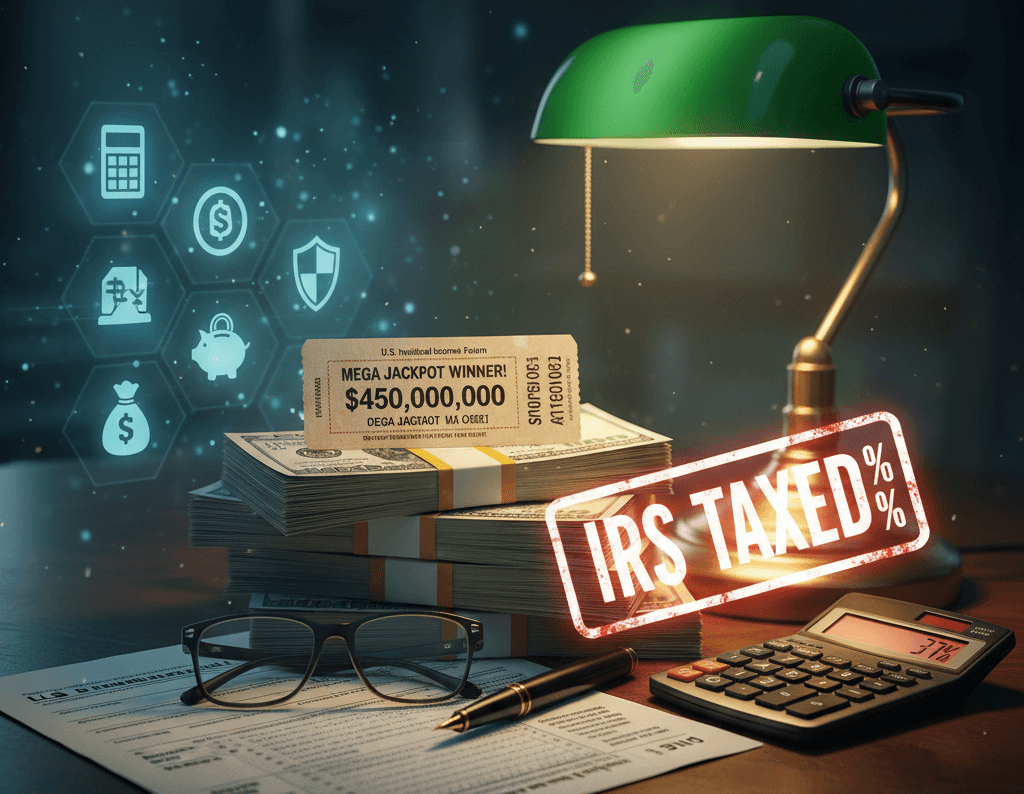Why the IRS Taxes Lottery Winnings?
Why the IRS Taxes Lottery Winnings?
Getting millions of cash overnight, being able to quit your work, pay off debt, and living life on your terms could all seem like dreams come true if you win the lotto. The IRS takes a sizable chunk before you even see your winnings, so there’s another narrative hidden in the tiny print for every headline that hails a new millionaire.
So why are lottery winnings initially subject to taxation by the Internal Revenue Service (IRS)? To what extent does your award money end up in your bank account? And is there any way to legally minimize your tax bill?
HSBC Cashback Credit Card 2025 – Benefits, Rewards & How to Apply?

The IRS View: Lottery Winnings Are “Income”
The first and most important thing to understand is this: lottery winnings are considered taxable income by the IRS.
Whether you win $600 in a scratch-off or $600 million in Powerball, the U.S. tax system treats your prize as “ordinary income,” just like wages, salary, or freelance earnings.
Under the Internal Revenue Code (IRC) Section 74(a), “prizes and awards” must be included in gross income unless specifically excluded by law — and lottery winnings are not excluded.
Federal Tax Withholding on Lottery Winnings
The IRS doesn’t wait for April 15th to collect its share.
When you win more than $5,000, the lottery commission automatically withholds 24% of your prize for federal taxes at the time of payout.
But here’s the catch — that 24% might not cover your total tax liability.
Lottery winnings are taxed as ordinary income, which means they’re subject to the highest federal income tax brackets. In 2025, the top federal tax rate remains 37% for high-income earners.
So if your lottery jackpot pushes your total income into that bracket, you could owe an additional 13% or more when you file your return.
Why Are Lottery Winnings Taxed by the IRS?
Fairness and uniformity in the tax system are the foundations of the reasoning behind the IRS’s taxation of lottery winnings. This is the reason:
Unless exempted, all income is taxable.
The U.S. operates on a comprehensive income tax system, meaning any increase in wealth — from wages, investments, or chance — is taxable unless explicitly excluded. Since lottery winnings increase your wealth, they fall under taxable income.
Gambling Is a Privilege, Not a Right
Lotteries are regulated gambling activities. Just like casino winnings, the IRS treats them as unearned income that must be reported and taxed.
The Patchwork System of State Lottery Taxes
State taxes can differ significantly, even when the federal government collects its share.
State-by-State Variations:
- No State Income Tax: Lottery wins are completely exempt from state income tax in states including Florida, Texas, South Dakota, Tennessee, Washington, and Wyoming.
- States with moderate tax rates include Arizona (4.8%), Colorado (4.55%), and North Carolina (4.75%).
- High-Tax States: The most aggressive states are Oregon (up to 9.9%), New Jersey (up to 10.75%), and New York (up to 10.9%).
- City Taxes: Local winners pay some of the highest taxes in the country due to New York City’s additional 3.876%.
Reporting Requirements and IRS Form W-2G
IRS Form W-2G must be issued by all lottery agencies for prizes over $600.
This form provides reports on:
- The entire sum that was won
- The amount deducted for federal taxes
- Your address, Social Security number, and name
When you file your annual return, you have to include this income. IRS audits, penalties, and interest on unpaid taxes may result from failure to disclose lottery proceeds.
6. Lottery Winnings and Tax Brackets in 2025
Here’s how a big jackpot could affect your federal tax rate:
| 2025 Federal Tax Bracket | Single Filers | Married Filing Jointly | Tax Rate |
| Up to $11,600 | Up to $23,200 | 10% | |
| $11,601 – $47,150 | $23,201 – $94,300 | 12% | |
| $47,151 – $100,525 | $94,301 – $201,050 | 22% | |
| $100,526 – $191,950 | $201,051 – $383,900 | 24% | |
| $191,951 – $243,725 | $383,901 – $487,450 | 32% | |
| $243,726 – $609,350 | $487,451 – $731,200 | 35% | |
| Over $609,350 | Over $731,200 | 37% |
Even if you previously earned $50,000 a year, a $10 million jackpot pushes you instantly into the top tax bracket.
Historical Context: When Did Lottery Winnings Begin to Be Taxed by the IRS?
Since the Revenue Act of 1913, which created the current federal income tax, lottery wins have been subject to taxation.
Lotteries and gambling were less widespread back then, but as states legalized lotteries in the 1960s and 1980s, the IRS made it clear that all profits were taxable income under Section 74 of the tax code.
Federal collection and compliance were streamlined in 1992 when new regulations mandated automated withholding for rewards over $5,000.
8. Common Misconceptions About Lottery Taxes
| Myth | Reality |
| “Lottery winnings are tax-free because it’s luck.” | False. The IRS treats them as taxable income. |
| “I only pay taxes if I take a lump sum.” | False. Both lump sum and annuity payments are taxable. |
| “The lottery commission handles all taxes for me.” | Partly true. They withhold a portion, but you may owe more. |
| “If I split the winnings with family, it reduces my tax.” | Not automatically. Gift tax laws still apply. |
| “I can avoid taxes by investing quickly.” | No. The initial income tax applies before investments. |
How to File Your Tax Return with Lottery Winnings
Lottery winnings should be reported under “Other Income” on Schedule 1, Line 8b of your Form 1040.
The lottery commission’s W-2G form should be attached.
You may deduct gambling losses under Schedule A (itemized deductions), but only to the extent of your wins.
The Prospects for American Lottery Taxation
Congress is unlikely to lower lottery prize taxes anytime soon given the widening budget deficits in the United States.
Nonetheless, some legislators have suggested:
- Increased withholding limits for really large jackpots.
- tax brackets for gaming income that are more straightforward.
- Online lottery and sweepstakes earnings are subject to digital tax systems.
In order to ensure complete compliance in the era of app-based ticket transactions, the IRS has also stepped up its digital surveillance of online lottery platforms.
In conclusion: Why the IRS Taxes Lottery Winnings?
Your life can change if you win the lotto, but only if you are aware of the tax ramifications of unexpected income.
Lottery wins are subject to taxation by the IRS since they are, quite simply, taxable income. You should budget between 30% and 45% of your winnings for taxes due to both federal and state levies.
The most effective tactic?
- Make plans in advance.
- Employ professionals.
- Continue to comply.
And never forget that retaining what’s left is just as crucial as initially winning it.
How U.S. Auto Loans Differ from Leases: Costs, Ownership, and Financial Impact Explained
How U.S. Auto Loans Differ from Leases: Costs, Ownership, and Financial Impact Explained
